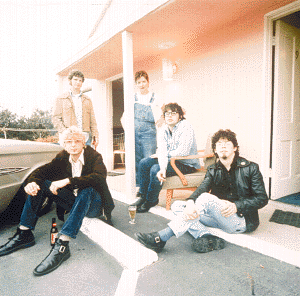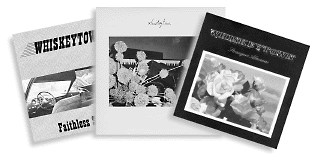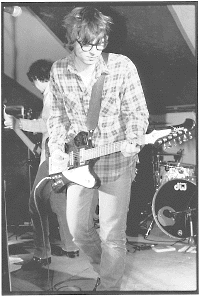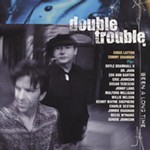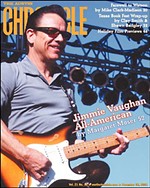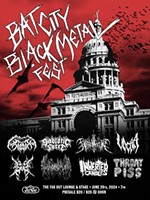No Expectations
Whiskeytown
By Andy Langer, Fri., Sept. 5, 1997
|
|
Last week, Ryan Adams shipped all his belongings to Austin. Later this fall, when his band Whiskeytown isn't touring as much, Adams will join his record collection and those few odd boxes, and move here as well. "I just know people too well in Raleigh... or not well enough, actually," says Adams of the motives behind his move from North Carolina. This is probably true, but armchair psychologists might also be right in deducing that Adams is coming to Austin to do battle with some of his demons, and that it's both appropriate and ironic that his actual arrival has been preceded by his baggage.
For the past 18 months, the 22-year-old Adams has been struggling with the personal and professional consequences of a single Austin show, a surprisingly crucial 1996 South by Southwest showcase he calls Whiskeytown's "turning point." Adams isn't known for understatements, but this may well be one, because it was this SXSW gig that nearly broke up his band. The turmoil brought on by that performance can be heard on Whiskeytown's major-label debut, Stranger's Almanac, but the gig's real legacy remains that it necessitated a complete and thorough analysis of why, and for whom, Adams and Whiskeytown perform.
At the time, Adams was performing mostly because he had written some country songs and enjoyed playing them. To that end, he'd formed Whiskeytown two years earlier, in 1994, after drummer Skillet Gilmore, fiddler Caitlin Cary, and guitarist Phil Wandscher signed on for what promised to be a low-frills, low-expectation Americana outfit. By all accounts, large Raleigh crowds and a couple of critically acclaimed indie singles didn't change the band's ambitions or focus; country music and drinking go hand in hand, and Whiskeytown drank as well as it played. In fact, for what should have been several of Whiskeytown's biggest showcase and festival appearances, Adams canceled in favor of nursing a hangover. In retrospect, Adams says the band's first real mistake may have been showing up for its SXSW showcase.
Then again, why wouldn't they? Adams had made plans to meet with Whiskeytown's Austin-based management team, hang out with the Old 97s, and get introduced to local legend Alejandro Escovedo, who would eventually join the band in the studio for Stranger's Almanac as well as inspire Whiskeytown's recent cover of the True Believers' "The Rain Won't Help You When It's Over." In addition, the band had just released Faithless Street, their first full-length release, and even small independent labels like North Carolina's MoodFood appreciate it when their bands support their albums with SXSW appearances. All of that happened over Whiskeytown's SXSW weekend, but apparently the music industry at large had something more in mind for the band's Austin trip.
In what's become something of an infamous SXSW tale, a pack of competing major-label A&R representatives literally surrounded Whiskeytown's van just moments after the band had finished its showcase at the Split Rail. Adams, who remembers being hung over and playing a sloppy gig, says he'd seen the suits in the crowd and retreated to the van precisely to avoid such a scene. Nevertheless, industry weasels swarmed the van, pressing their business cards against the windshield. By all accounts, Faithless Street and that gig had made Whiskeytown the conference's hottest act and alternative country's great white hope. Last March, reflecting on that night, Adams told the Chronicle, "After all was said and done, the labels wanting to sign us was probably more detrimental than it was positive."
Although the band continued to tour after their SXSW experience, a different A&R rep met them at almost every gig along the way, sparking a bidding war ultimately won by Outpost, a Geffen offshoot that promised the band almost total autonomy and the chance to record and release albums almost as often as they're capable. By that time, however, the damage done by that Austin appearance had surfaced, with Gilmore and bassist Steve Grothman opting out of the bidding war and out of the band. "I think they felt like it had gone to a place where they weren't comfortable," says Adams. "I know that at the time, Skillet didn't like the idea that it had turned into a lot of phone calls, managers, and lawyers. I can see how he felt that way, because we were hardly ever playing."
In retrospect, Adams says Whiskeytown's post-SXSW period of internal disarray clearly strengthened the bond between himself, Cary, and Wandscher. Better yet, it was an obvious test of each member's loyalties to each other and the band. Yet even after recruiting a new rhythm section (bassist Jeff Rice and drummer Steve Terry), the task of quickly turning around and recording their Outpost debut with producer Jim Scott (Samples, Tom Petty, Johnny Cash) seemed daunting.
"We were a pretty big mess at the time, and I think [Scott] pretty much felt that we sucked," says Adams. "I think he loved the demos and the stuff we had going on before we went in to make the record. But by the time we got in to make it, so much of what we'd been had fallen apart that I think he felt he was literally working with nothing."
|
|
"Now, I'm pretty happy, but I wasn't at first," says Adams. "I didn't like it at all. It was to the point where I told the label I wanted to make another one. But with time, I realized what kind of record it is. A lot of people have talked about how at first it was appealing, then how they didn't like it, and then how different ideas on it started creeping up on them - hidden lyrics or melodies that present themselves better later. That's happened to me as a listener.
"I put it on and buzz check it every couple of weeks. I'll get a pretty good buzz, listen to Beggar's Banquet or some Tom Waits and say, `Alright, let me check out what my record sounds like.' Sometimes, I love it. Sometimes I like it alright. Usually, now, I love it. But I don't know how much pot other people have to smoke to get into it. For me, I have to pretty much get away from myself to get how cool it is. I've listened stoned and really enjoyed it. And that doesn't always happen, because I've listened to [the Rolling Stones'] Dirty Work stoned and it still doesn't sound good to me."
High Tide and Green Grass
It's no coincidence that Adams counts Beggar's Banquet and Dirty Work among his buzz-check yardsticks, because he makes no secret that he likes the Rolling Stones as much, if not more, than Johnny Cash or the Louvin Brothers. It's also no secret that the Stones have written their share of great country tunes. But since being pegged as the next big thing, the band's reshuffling, and the release of Stranger's Almanac, there have been times when Adams had to remind himself that you can't always get what you want, or more importantly, that fans can't always get what they want.
Within the ranks of Whiskeytown fans are essentially two schools: those who see the band as part of the alternative country movement, and those who embraced the jagged edges of Faithless Street and anticipated a full-on rock follow-up. And although no less an authority than No Depression magazine co-founder Grant Alden used his space in Rolling Stone to say Stranger's Almanac proves, "If there's to be a Nirvana among the bands that are imprecisely dubbed alternative county, look to Whiskeytown," Adams acknowledges it's almost a given that neither camp will be wholly satisfied by the diversity found on the new album.
"I think most people really expected a rocking record, a real raw, Stonesy kind of record, maybe like Faithless Street, but a little more into the red," explains Adams. "But there would have been no point in making that record right now. It wasn't the record we needed to make."
Adams claims that between the release of Faithless Street and the recording of Stranger's Almanac, different incarnations of the band recorded some 60 other songs, many of them in that "raw, Stonesy" vein, and had therefore already worked through the rock & roll songwriting cycle without stopping to release it publicly.
"By the time we got to the studio to make Stranger's, we'd already made the rock record for ourselves, so it was hard to backtrack," he says. "If we had released the first good 12 songs we recorded since Faithless Street, we'd still be stuck in the past. We'd have ended up totally bored. And if it goes the way the we think it does, by our schedule, we'll make a record and tour for eight months at most, and go make another record. It didn't make sense for us to make that rock record, knowing we'd tour the songs for eight months. Not only would that stuff be old to us, but by the time we got to the studio the next time, we would still be a year behind ourselves. So we sacrificed that record, said `fuck it and let's make the record we're going to make right now.'"
Although Stranger's Almanac was recorded quickly, Adams doesn't deny that one of the goals was to make a slick, almost overproduced record - capable of sonically enveloping a traditional country tune like "Houses on the Hill," a rocking duet with Escovedo titled "Excuse Me While I Break My Own Heart," a Muscle Shoals-style groover, "Everything I Do I Miss You," and the artsy psychedelic leanings of the album-closing "Not Home Anymore." Of course, Adams also recognizes that big production values leave Whiskeytown open to charges that they sold out just in time for their major-label debut.
"In some ways, it must seem strategic as fuck," acknowledges Adams. "But I think we made a really cool, really smart record. And I don't think there's anything bad about us making a kind of really cheesy-sounding record. For instance, I really like that record Don't Tell a Soul by the Replacements. Now that's a very cool album by a cool band, but what makes it even cooler is that the producer of that record, Matt Wallace, stepped in and said, `Listen boys, we know what you can do lo-fi and we know what you can do strung out, because you've been that way for eight years. But we're going to make you sound good now.' It's proof that you can have a record sound really great and still be cool guys in a cool band."
Ultimately, the truth is that it's less the anticipation and expectations of the two Whiskeytown camps that matter, but more what virgin Whiskeytown listeners make of Stranger's Almanac - without Adams' private recordings or even Faithless Street on which to base their opinions.
"I hate the idea that Strangers is really the only record you can get from us right now," says Adams, who says Outpost plans to re-release Faithless Street later this year. "And yet, at some point, I have to realize that when people are introduced to this record they're not going to know we have stuff that's cooler, less slick, and less intricate. I realize that now, but when I made the record, I was making it for myself. We didn't actually analyze it until later. I actually panicked. `Oh my god. If this is the first big one, we're fucked. People are going to think we totally suck.'
"But I thought about it more and decided that was bullshit. If I thought about losing and gaining [fans] on an individual person-to-person basis, I'd go crazy. I'd never go anywhere, afraid to walk for running. Making the kind of record we just did will probably be really good, because now things can only go backwards - back to simpler recordings - more live in the room recordings, more obscure songs, or songs that we feel are influenced by obscure artists.... It's easier now to go do whatever the hell we want. We did what we wanted this time, too, but now we can continue that, and it just happened what we wanted to do with this record was make a pretty big-sounding record."
Aftermath
|
|
"In the past, we have been an unsuccessful live band, a disaster, and for the most part, we didn't care, because we were just doing things our way," Adams says. "But lately, our live shows are much more precise. We've developed live, so to speak. We finally have the perfect lineup and have learned how to play to audiences - plus, I don't have to get nearly as fucked-up to do it."
On this latest tour, Adams claims he's lost much of the chronic stagefright that used to require two Long Island ice teas and 12 beers to quell. Could it be that he's gained confidence from finally accepting his role as the band's frontman? Apparently not, as Adams still denies he's Whiskeytown's leader.
"I don't really lead this band," stresses Adams, "that's not my mission with Whiskeytown. This record has all my songs on it, but it's just that nobody in the band had written any in that period. This next record, Caitlin will probably have a couple, and Phil will probably contribute three or four. But I think those guys are reluctant to step into the spotlight because they're realizing how extremely tough it is on somebody.
"It's not easy to be up there and be looked at like that - especially because we had different ideas when we started the band. When we started, we assumed a shared limelight. Now, it falls mostly on me. It just makes me more scared and apprehensive about what I'm doing and how to do it. A lot of times you just have to step up there and say, `Alright, if the spotlight is going to fall on me, I'm going to take the ball and run with it, fuck it.' It's better than standing there and saying, `I don't want to play this game.'
"I didn't ask for it, it just kind of happened. It's a weird thing, but there's no jealousy in the band from it, because they don't want it and know I don't either. They've got it a little easier, though. Not much, because they have to deal with my shit dealing with it, which is probably worse."
Adams is quick to point out that just because he's moving to Austin, the rest of Whiskeytown won't be free of his bullshit. Currently, he's planning on spending no more than three weeks at a time away from the band, reuniting mostly for roadwork and recording stints. Whiskeytown's long-term plan, says Adams, is to tour quickly and release records often.
"My idea of how this should be is that you hit every city and if somebody wants you back bad enough, you go hit it again. And that's it: `Thanks, see ya later. Glad you liked the songs, and if you missed them, tough shit. Here comes the next record.' Then it's time to play those songs. Then maybe, eventually, you figure out all the songs you really love, play those live, and throw in a few off the next record."
By Adam's current estimation, that "Greatest Hits" period of touring shouldn't come for Whiskeytown until they're at least six albums into their career. For the time being, though, Adams and Whiskeytown seem to be right on schedule; currently touring for the new album, the band has tracks in the can for Big Star and Tom T. Hall tributes, and is ready to begin recording a new album, a process to which Adams says he's already given a great deal of thought.
"I think people will really freak out how different the next one will be from this one," says Adams. "We want to make a different record every time. We never want to make the same-sounding record. That's why I appreciate bands like NRBQ or American Music Club, because it seems like they have no agenda... Like, with us, I honestly do not think we are alternative country. I think we are an American rock & roll band that plays country songs. We play country music when we want to. We play rock & roll when we want to...
"And there's complete artistic freedom amongst ourselves in the band to explore any avenue. We could even try raga, dub. I don't really think we could actually play that stuff, but if somebody wanted to try it, we'd give it a shot. We're mostly about really good songs, regardless of style, which gives us freedom. There's not any gimmick to our band, which probably means we'll be around at least a little while, until not having a gimmick isn't cool any more." mum
Whiskeytown, Buick Mackane, and the Volebeats play the Electric Lounge, Saturday, Sept. 6.





